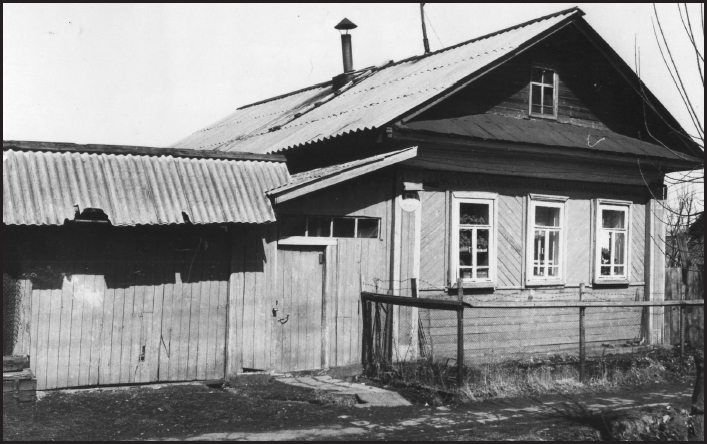
Vasiliy Bryukhov’s parents’ house.
The 18th Tank Corps was withdrawn for rest and reinforcing. On 1 November the 170th Tank Brigade left the village of Bucsa and, after three night marches from Dioma to Synpetrul via Battonya, stationed itself in Kovacsi, 8 kilometres north of Timisoara. As usual, during regrouping there was some reshuffling of personnel. Senior Lieutenant Jumin was appointed commander of the 2nd Battalion, to replace Senior Lieutenant Matveev, who had died during an enemy bombing raid on 21 October. Major Grishenko became the commander of our 1st Battalion, and Captain Otroshenkov commander of our 3rd Battalion.
It was the ‘golden summer’ of 1944, and those were surprisingly warm, sunny and cloudless days. The air was fresh and clear, especially at night and in the early morning. Kovacsi was a fairish, clean and neat German settlement, and many soldiers began to feel enmity towards the locals. The latter recoiled in fear, anxious about reprisals. One could hear the word ‘Fascists’ spoken by our soldiers and officers more and more frequently. The combrig and the head of the political department realized this – they called meetings to make everyone understand that the war was against Hitler’s Nazi clique and not against the peaceful, innocent people of Germany. To highlight this, the troops were reminded about the tragic incident in Krajova. The situation was settled in time and our stay in Kovacsi continued quietly: the locals quickly calmed down and began to treat us with more respect.
We quartered in local houses, and immediately set about servicing our equipment and getting our troops in order. I stayed in a separate house on my own. The hostess cooked breakfasts for me in the mornings, and I had my lunches in the officers’ dry mess.
Unexpectedly I saw Maria Maltseva walking by, looking nice and slender.
‘How on earth did you get here? And where is that little tummy of yours?’
‘It used to be here, but now it’s gone,’ she said, evasively – and no matter how many times I asked, she would never tell me what had happened to her baby.
We started to see more of each other and we stayed together until I was sent to Yugoslavia.
Her life had been harsh. Maria used to live in the Belgorod Oblast. Before the war her father had been appointed a division commander in Belorussia. Having completed nine years at school, Maria went to stay with her father during the summer when the war caught up with her. She didn’t manage to get evacuated from the front line and had to retreat eastwards with her father. He was badly wounded in action and before he died he asked his deputy – a 50-year-old lieutenant-colonel – to take care of his daughter, get her out of the danger zone and send her home to her mother’s place. After her father’s burial they kept on retreating further eastwards.
While travelling they would stop in villages at night. One night, the girl was particularly feeling her father’s death, and was sobbing. The lieutenant-colonel, supposedly consoling her, made her drink vodka, convincing her that she would feel better. In the morning she woke up in bed with this scoundrel. The man asked for forgiveness, saying that he didn’t remember how it had happened, but the next night the same thing happened. It had continued like this until they had got out of the area encircled by the enemy. Reaching our lines, she fled from the lieutenant-colonel and registered with the first available raivoencomat;49 she joined a training course for medics, completed it and was sent to the front. She’d been with the brigade since the time of the Korsun–Shevchenkovskaya battle.50
Maria was deeply in love with me and kept asking: ‘Vasya, let me get transferred to your battalion.’ But there were no girls in the battalion, and we already had a medical instructor, Sergeant Korbut.
I made excuses: ‘The battalion commander has no girlfriend nor does his deputy, and so if you are going to be with me, it isn’t going to look good. People won’t understand. When I become Chief-of-Staff then I can make it possible.’
One day Kolya Maximov and I went to see if one of the damaged tanks that we had left behind 10 kilometres from Kovachi had been repaired. We had no vehicle, but Kolya procured a couple of horses from somewhere, so we saddled them up and took off. I had ridden horses since I was a child, but had never used a saddle before. This time I decided that it would be more comfortable to use one. As we were riding over the 10 kilometres I realized that I was going to have problems walking afterwards. When we got there, we found the tank wasn’t ready. We pulled out our dry rations, had a bite to eat and headed back. It was a nightmare! I barely managed to get back to our camp. The whole of the next day I walked around with my legs apart and vowed never to ride again.
On 5 November the 18th Tank Corps was placed under the charge of the 3rd Ukrainian Front. On the 7th, while we were still in Kovacsi, the brigade celebrated the twenty-seventh anniversary of the Great October Revolution. For the first time during this conflict we were allowed to celebrate under clear sky far away from the front line. The brigade units lined up on a small patch of ground; Colonel Chunikhin made a short speech and decorated soldiers and officers who had distinguished themselves in the Jassy–Kishinev operation with orders and medals. Everyone then greeted each other, and the awarded men were congratulated on their medals, followed by a ceremonial parade. In the evening the combrig invited the officers for a festive dinner; he toasted our victory, congratulated the men who had been decorated and wished that we would all survive and destroy the hated enemy.
Time was running out fast: the brigade was getting ready for new operations; the manning of the units and reshuffling of the officers was in full swing. On 18 November Chief-of-Staff Major Novikov and the deputy brigade commander, Major Panov, suddenly departed for treatment in hospital. Later, my friend Sasha Chernogorov, Chief-of-Staff of the 2nd Tank Battalion – a tall handsome bloke, born in 1923 – gave me the following account of the incident. One evening a beautiful signalist Masha Reshetova – his girlfriend – was about to come over from the brigade to visit him. For such an occasion he set up a table for the two of them in the HQ. As evening approached, the Chief-of-Staff Major Novikov turned up. He entered, and Sasha leapt up and offered the major his seat. The man sat down.
‘How are things here? Have you posted guards?’
‘Aye, comrade major. Would you join us for a drink?’
‘Well, why not?’
They had a drink, and the major said: ‘Listen, Sasha. It’s going to get dark shortly: you go out and check on the posts, the guards – make sure everything is all right. Take your time – a couple of hours?’
‘Yes, comrade major’ – and off he went. Two hours passed, and he heard the sound of an engine – that was the major and the signalist going off to the brigade HQ together. A week later, and news emerged that Masha Reshetova and Major Novikov had both been sent to a hospital – they had ‘become sick’. Hearing this, Sasha jumped for joy: it could have been him that needed to go to hospital instead!
On 18 November an order arrived: ‘The brigade to be in full readiness to set off to the town of Subbotina to receive tanks’ – the respite was over. Quick preparation for the march began. The departure for Yugoslavia worried me and Kolya: the life in Romania had quickly become peaceful and comfortable; the shops, cafés and restaurants all worked. I’d been paid my allowance for November and a bonus for a number of destroyed enemy tanks (330,000 leu), and Maximov had received his for a month and for three shot-up tanks (150,000 leu). We had to spend this money quickly. We went to see the combat, but Major Grishenko sent us to the combrig.
Colonel Chunikhin was in good spirits: ‘Hey, millionaires! What kind of business brings you here? What do you want, Vasya?’ (He always called me by my first name.)
‘Comrade colonel, we seek your permission to go to Timisoara to get rid of this money.’
Chunikhin became pensive for a second and quickly made up his mind: ‘All right, go for it. But be back at the brigade at 16.00 on the 22nd.’
‘Yes, comrade colonel!’
Kolya quickly found a horse cab, and without even stopping for breakfast we were on our way to Timisoara. Within an hour we had entered the city. One of the first signs we managed to read was ‘Restaurant’. We stopped the cab straight away and paid the driver off. When we entered the restaurant there was no one inside, it was semi-dark, and the tables had white cloths on them. We took our seats. A waiter arrived and gave us a menu in Romanian. We made it clear with gestures that we were hungry, then we explained in a mixture of German and Russian that we wanted to eat. He brought appetizers, then steaks – we had a really good meal. When we had finished, the waiter asked: ‘Coffee?’
I asked Kolya: ‘Have you ever tasted coffee?’
‘Yes.’
‘I haven’t. I’ve only tried stuff made out of barley. We have to taste this.’
‘Cognac? Rum?’ asked the waiter.
That was interesting – coffee with cognac or with rum! How good would it be?
Kolya said, ‘I’ll have one with cognac, you with rum.’
They brought us coffee cups with about 30 grams of rum and cognac in each. The coffee was hot; I sipped some, then choked and began to cough. ‘Oh dear,’ I thought, ‘they’ve spoilt a good drink.’
We finished the coffee and Kolya asked: ‘Have you ever drunk cognac properly, on its own?’
‘Never.’
‘Me neither.’
‘Shall we?’
‘Sure.’
We called the waiter over and asked him to bring us some cognac. He brought the bottle and poured some into small wine glasses. Kolya took the bottle from him and poured larger ones. We chased it down with some more coffee, as they’d brought us refills. We had a second go with cognac and then the bottle was empty. I asked: ‘Have you ever tried rum on its own?’
‘Never.’
‘Me neither.’
‘Waiter, rum!’
The chef in his toque blanche had come out into the restaurant to see what was going on. So we also had some rum, then paid up and staggered out, horribly drunk. We walked around a bit and saw a female traffic-controller at a road intersection. There was no traffic at all. We approached her and began fooling around, but she pushed us away, shouting at us. Hearing her yells, some of her friends looked out of a neighbouring building and shouted: ‘Guys, leave her alone, come here!’
We went to see them and said: ‘We’ve got money. How about a party?’ We gave them money to go and buy drink and some snacks, but while they were gone we fell asleep, out for the count and didn’t wake up until the next day. When we struggled to remember where we were and what we’d done, the girls just laughed: ‘Hey, you cavaliers – how did you like the party?’ We were really embarrassed, drank a cup of tea and furtively left.
We had a walk around the city and called in at a tailor’s shop. I ordered myself and Maria Maltseva kubankas,51 Kolya ordered one as well, and we also ordered suits for ourselves. Everything was ready the next day. We spent the next couple of days enjoying the female delights of the town before we finally ran out of money. Realizing we had to get back to Kovacsi somehow, Kolya decided to improvise and snatched the first nearby horse he could find. The owner tried to resist but Kolya clapped his hand on his pistol holster and the guy backed off.
We got on the horse and took off. On the way back we stopped at a shop to buy a box of wine, a pack of sweets and some honey cakes. We gave the shopkeeper all the money we had got left but apparently that was not enough, and he began to yell at us. We had to wave a pistol under his nose to calm him down. From there we dashed back to Kovacsi, reporting our arrival to the combrig, and saw that the units had already started assembling into a column, heading for Baymok. We were so tired that we climbed into an HQ van and fell asleep. When we woke up, we were in desperate need of some sustenance but all we had were the sweets and honey cakes.
Our pleasant stay in Baymok was to be short: by 26 November the first train loaded with tanks arrived at the local station. The combrig handed twenty-one tanks over to the 1st Battalion, ten to the 2nd, and three tanks were given to Kolya Maximov to equip the brigade command platoon.
Before the tanks arrived, Colonel Chunikhin summoned us. We told him in great detail about our journey to Timisoara and there was a lot of laughter. Then he switched the conversation to more serious business: ‘Vasya and Kolya, you understand that the war is nearing its end. You are both only 25, and it will be extremely unfair if you don’t live to see victory. That is why I have decided to appoint you, Kolya, as the combrig’s platoon commander. You will stay near me – you will not go into battle as often, and hence there is a better chance you will stay alive. As for you, Vasya, I plan to promote you to Chief-of-Staff, with the future prospect of being combat.’
Of course, Kolya began to get indignant: ‘How can I leave my friend?’
The combrig replied: ‘Think about it – I’ve only got your best interests in mind. Think it over; don’t reject it out of hand.’
We left the combrig, perplexed and in low spirits. We returned to my billet, and the hostess set a table for us. We sat at the table for some time and had a drink.
‘Kolya,’ I said, ‘he was talking sense. We have to agree.’
He thought and replied: ‘Perhaps you are right. It will be better, and at least one of us will stay alive. After the war we will head back to Moscow, we will study in the academy and live at my place in Arbat. Let’s drink to it!’
Over the next two days more trains with tanks arrived, and the brigade was back up to full strength. Soon all the combats reported on the readiness of their battalions to march. Most of the officers of the brigade, down to the rank of company commander, considered themselves veterans now, and rightly so – they had considerable battle experience. The combrig and his zampolit Negrul were the heart of the brigade. These two officers understood each other extremely well and worked as a harmonious team, setting great examples that we tried to imitate.

Vasiliy Bryukhov’s parents’ house.

With his dog Graus in 1936.

Gymnastic school group: Lunegov, Fofanov, Svetlakov, Nikolai Bryukhov, Penegin, Titov and Vasiliy Bryukhov.

Gymnastic school group during a workout in 1941.
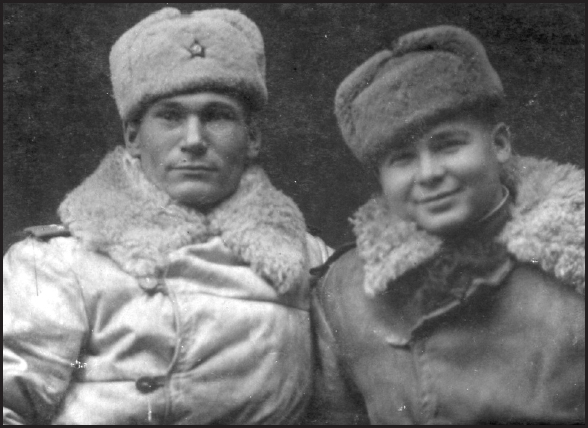
Vasiliy Evstafev and Vasiliy Bryukhov, 1943.

Lieutenant Vasiliy Bryukhov.
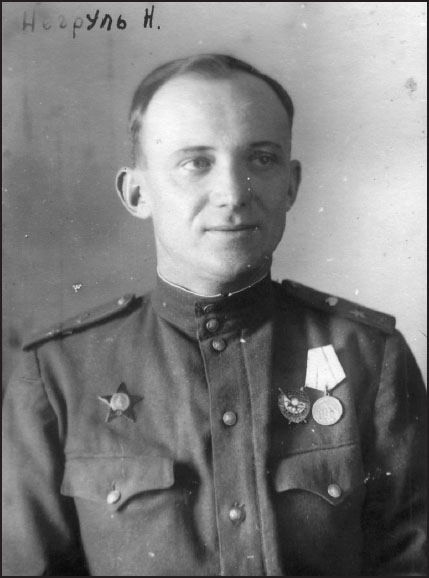
Lieutenant-Colonel Negrul, head of the 170th Tank Brigade's political department.

Lieutenant-Colonel Chunikhin, commander of the 170th Tank Brigade.

The battalion’s Chief-of-Staff Sergeant Alexei Rybakov.
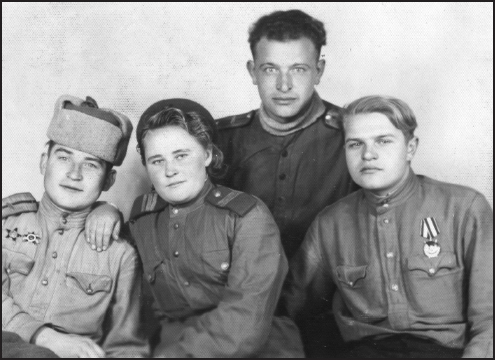
Tankmen of Bryukhov’s company: Lieutenant Aleksashin, unknown, Lieutenant Bikmulin, Lieutenant Ivan Zoria.

Company commander Vasiliy Bryukhov, battalion political deputy Stepan Klimov, battalion technical deputy Sergienko. February 1945.

Gunner Blinov.

The encampment of Bryukhov’s 1st Battalion of the 170th Tank Brigade in Austria, summer 1945.
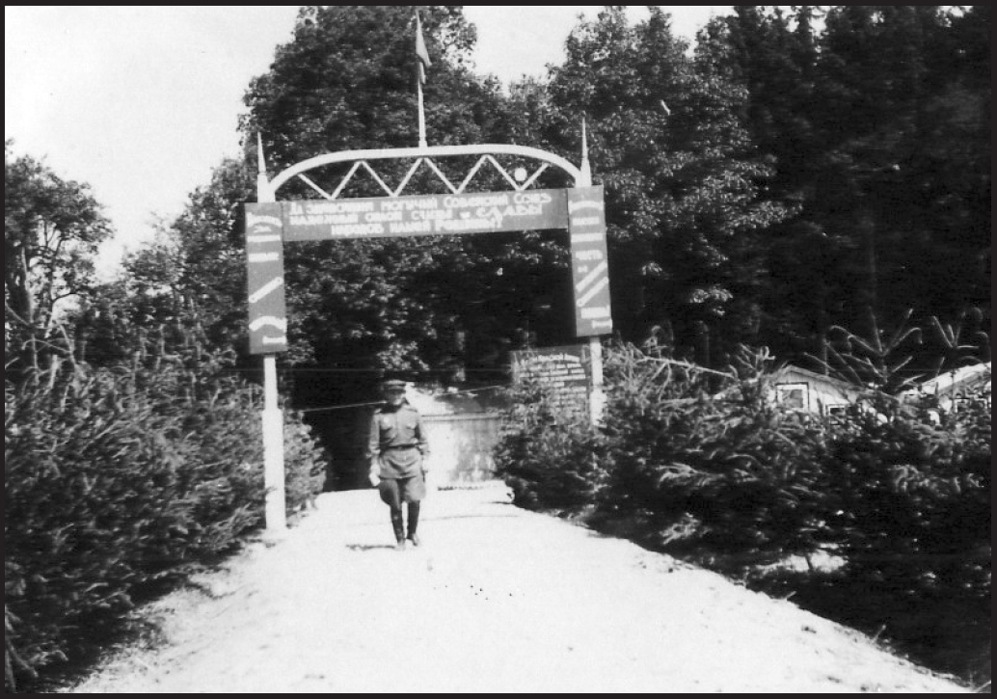
Another photograph of the encampment of Bryukhov’s 1st Battalion of the 170th Tank Brigade in Austria, summer 1945.

Vasiliy Bryukhov and Faina Levinskaya (right).
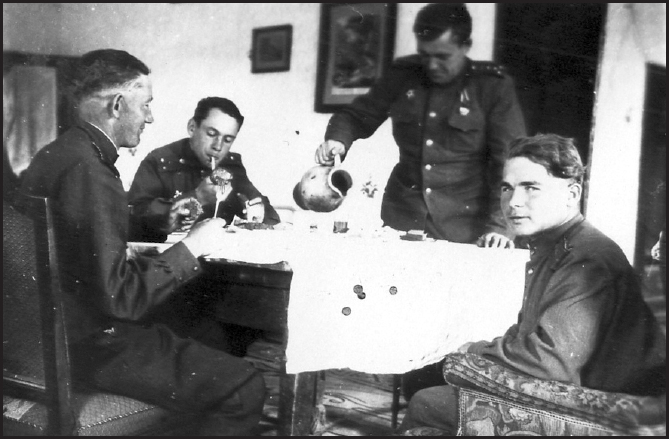
Officers from ‘temperance association’ in June 1945 (Vasiliy Bryukhov sitting in armchair).

Vasiliy Bryukhov with his wife Ekaterina.

Regiment commander Vasily Bryukhov fishing.

Regiment commander Vasily Bryukhov with his daughter.

Maintenance of T-34-85s of the 1st Battalion of the 170th Tank Brigade.

The first year of the second department of Stalin’s Armoured and Mechanized Forces Academy, 1948. Vasiliy Bryukhov is in the second row from the top, second from the right.
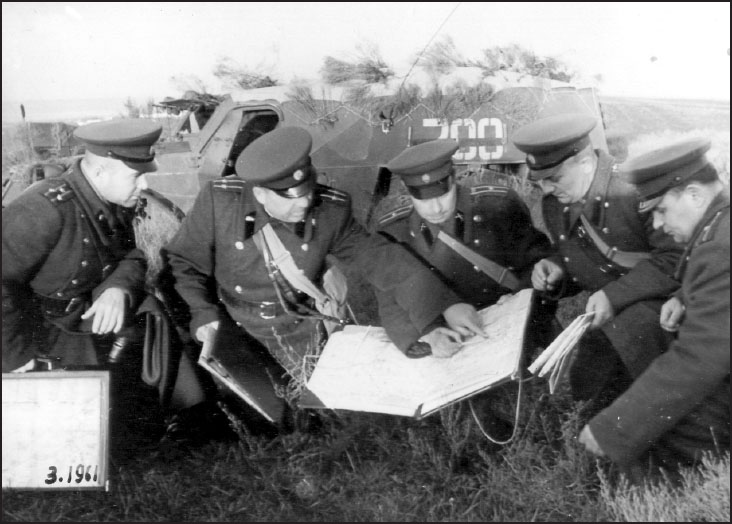
Vasiliy Bryukhov with other commanders during a staff exercise, March 1961.
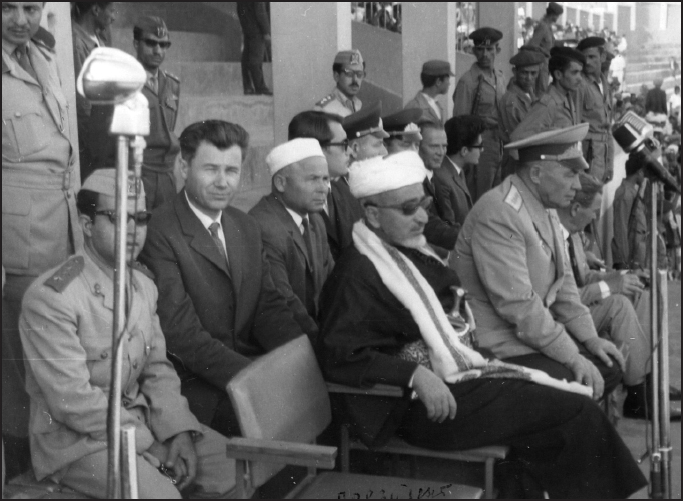
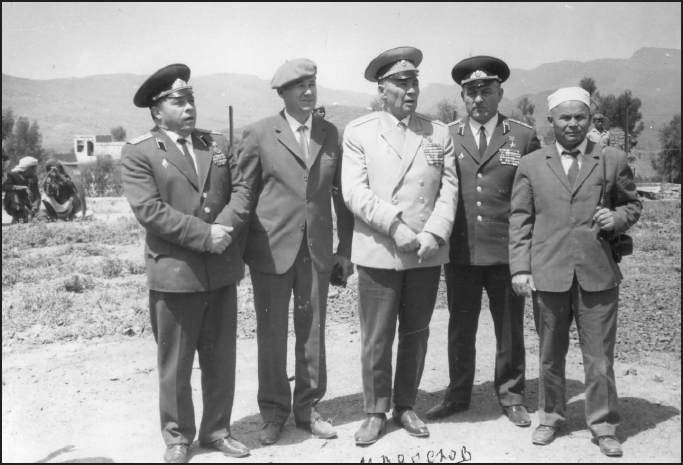
Two photographs of General Bryukhov during his time in the Yemen.

Generals Bryukhov and Dolgii receiving a report.

Vasiliy Bryukhov in later life holding a photograph of himself as a young man.